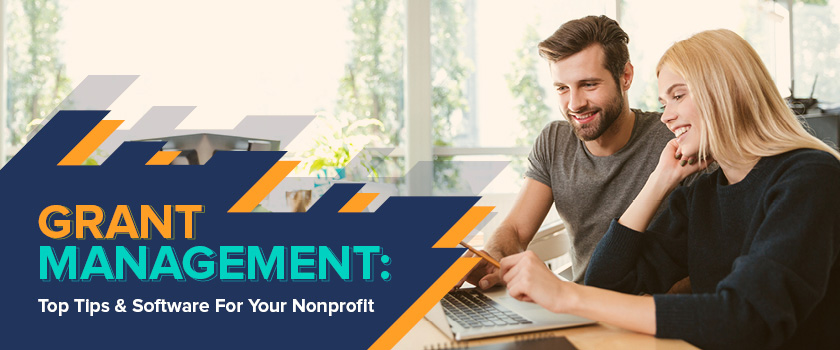
Grant funding is a valuable source of major funding for many organizations. However, the management of a single grant can become overwhelming– with deadlines, reporting requirements, and exacting cash flow standards. When you factor in that many nonprofits are applying for and implementing multiple grants at once, things can become challenging!
The grants available to nonprofit organizations are wide-ranging. Whether it’s a government-funded grant, a Google Ad grant, or even a private foundation-funded grant, your organization needs a strong management plan.
Through this guide, we’re going to explore grant management in depth. After a basic overview, we’ll cover the software and best practices that can empower your strategy:
- Grant Management: An Overview
- Grant Management Software: Tools to Assist Your Organization
- Grant Management System: 7 Best Practices
Are you ready to build successful grant management procedures for your organization? Let’s get started.

Grant Management: An Overview
What is the timeline of a grant?
When discussing grant management, it’s important to keep in mind the three key phases in the grant lifecycle.
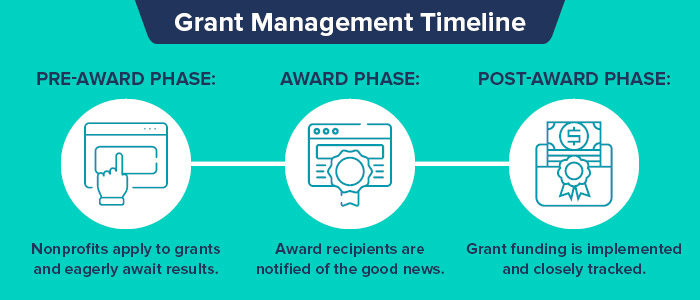
These include:
- The Pre-Award Phase. This is the phase when organizations discover the funding sources available to them and create all materials needed to apply. Nonprofits need to have robust organization procedures in place to ensure none of their application materials fall through the cracks. Grantmakers need to successfully manage the many applications coming their way to choose the best grantee possible.
- The Award Phase. This is when nonprofits are chosen for grant funding and notified of the awards.
- The Post-Award Phase. After grant funding is awarded, the journey has just begun. Nonprofits and grantmaking organizations need to closely monitor the usage of granted funds, ensuring that funds are used correctly and effectively.
It’s important to remember these phases, as each step along the lifecycle has unique grant management needs. What is required of the pre-award phase is drastically different from what is needed in the post-award phase, and so on.
Why is grant management so important?
When a donor gives to your organization, they do so without strings. They make a blind donation, trusting that your organization is putting it toward a good cause even if you don’t explicitly define that effort prior.
On the other hand, grants are incredibly specific. They involve detail-intensive applications, stipulations around how the funding can be used, how that use should be communicated, and even the timeline over which the grant will be used.
Grant management encompasses the procedures and technologies used to track and communicate all of these details. For grantees, effective management is essential for maintaining good relationships with grantmakers and therefore retaining funding. For grantmakers, effective management is crucial to ensure funding is used as prescribed.
All promises made during a grant must come to fruition, both on behalf of the grantmakers and the grantees, in order for the relationship between the two entities to continue. Effective grant management is what ensures that.

Grant Management Software: Tools to Assist Your Organization
There are many layers to effective grant management. Of course, a dedicated team is necessary to oversee the process from start to finish. However, with the many requirements and specifications, the documentation and intensive reporting required— grant management can be challenging for even the most focused of teams.
This is why it’s so crucial to back your team with comprehensive software. Many nonprofit organizations are turning to software to handle a variety of activities, and grant management is no different. This software should track grant deadlines, documentation, spending, and more. Then, it should produce comprehensive reports that nonprofits can present to their funders to maintain open communication.
We’re going to discuss a few top providers of grant management software for organizations that are managing large amounts of funding. However, let’s first discuss a few key software features your organization should keep in mind:
- Integrations with key databases for a comprehensive picture
- Multi-user access across your team for true collaboration
- Customization capabilities to meet the needs of your exact reporting requirements
- Accounting and reporting capabilities for full transparency
- Grant tracking calendar with progress and deadline tracking abilities
- Document library to store all essential and frequently used documents
- Project management features to keep your team on track
With that said, let’s explore a few top providers that can build out your grant management tech stack:
Salesforce’s foundationConnect
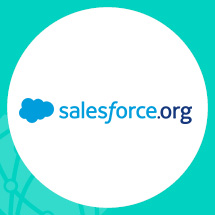
Salesforce is a well-known name in the for-profit world as a provider for constituent relationship management systems. They’ve even expanded their platform to create a version that’s pre-configured to fit the needs of nonprofit organizations— the Nonprofit Success Pack (NPSP)
They’ve now created foundationConnect, a platform tailored to meet the needs of grantmakers and grantees alike. foundationConnect has the following grant management features:
- Empowers grantmakers to track funding from initial application to distribution and outcomes
- Tailored portal for grantees to save in-progress and submit completed applications
- Status reports and ongoing updates for both grantees and grantors
For organizations familiar with the Salesforce system, foundationConnect is a great asset to improve the grants process from start to finish.
Blackbaud’s Financial Edge NXT
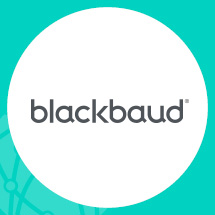
If you’ve explored large and enterprise-level nonprofit CRM software, you’ve undoubtedly encountered Blackbaud’s solutions. Blackbaud and Salesforce are often compared as equivalents for large organizations looking for a comprehensive solution. However, the grant management solutions offered by the two are quite different.
The biggest difference is that Blackbaud’s grant management software, Financial Edge NXT, was created for post-award management. It has the following stand-out features:
- Multi-grant management, ensuring nonprofits can track and meet the specific requirements of each grant awarded within one system.
- Detailed records on the history, notes, associated projects, and more for each grant with information down to specific transactions within the usage.
- Reimbursement management, allowing grantees to easily record direct and indirect costs correctly for reimbursement.
Remember— working with a comprehensive solution such as Blackbaud requires more than the initial investment. From training to customization, it’s a great idea to invest in Blackbaud consulting services to ensure you make the most of the solution.
EveryAction
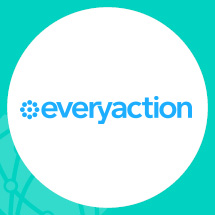
EveryAction offers a variety of nonprofit solutions contained within one comprehensive CRM system. Within that system, they’ve built out major gifts and grants management functionality to help nonprofits navigate the process.
It includes features such as:
- Workflows to identify and research prospective funders prior to application.
- Deadline and document tracking throughout the entire grant lifecycle.
- Results analysis throughout the grants process, from applications to fund usage.
For organizations looking to invest in a CRM with grants management capabilities built-in, EveryAction is a great solution.
SalsaEngage
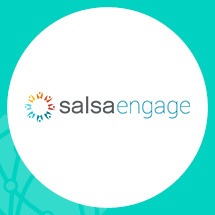
SalsaLabs’ SalsaEngage is a great grant management solution for nonprofits looking to optimize their fundraising and outreach efforts to fulfill the goals contained within grant proposals. Additionally, this marketing and fundraising platform integrates seamlessly with Salesforce.
SalsaEngage’s features include:
- Email automation for easy scheduling of updates to grant funders.
- Comprehensive online fundraising functionality to meet the needs of challenge grants.
- Built-in fundraising dashboard to compile analytics and share with grantmakers.
Organizations utilizing the Salesforce NPSP or grant management tools can combine that solution with SalsaEngage for a well-rounded, multi-dimensional grants management strategy.

Building a Grant Management System: 7 Best Practices

Align any grant opportunities with your organization’s greater strategy.
Whether you’re just starting to build your grants program or you’ve been applying for grants for a while, it’s understandable to approach any and all funding opportunities within reach. After all, your organization requires funding to accomplish its work, and one additional grant could be the difference between reaching your fundraising goal or not!
However, we encourage you to make sure you’re pursuing grants that align with your organization’s greater strategy. Remember that grant funding is often incredibly specific, narrowed down to the exact nonprofit efforts it can be used for. With that in mind, consider the following when investigating grants to apply to:
- Your specific nonprofit efforts. For example, if you’re completing a capital campaign but the grant you’ve been given is restricted to other areas, it may not be helpful for you.
- Your organization’s mission. If the grantmaking organization doesn’t support your mission overall, then they’re unlikely to grant funding to further it.
Grants need to be used for a specific, pre-defined purpose. So receiving grants that don’t actively pursue your organization’s goals and mission may be counterproductive.

Create a management plan before any funding is awarded.
It’s easy to focus on everything leading up to the awarding of the grant— the application, the proposals, the grants to apply for— and forget to plan for what’s going to happen after the funding is awarded.
However, whether you’re aiming for complex government funding or more straightforward Google Grants, your organization should create a plan for post-award grant management before even applying. This plan should include, but is not limited to, the following:
- Clearly defined roles and responsibilities for every staff member that encounters grant funding
- Plans for documenting all movements of grant funding and the implementation of promised tasks
- Plans for compliance with any existing regulations, especially in the instance of government-granted funding
- A strategy for compliance with reporting and auditing policies to ensure fund usage is clearly communicated
When your organization is granted funding, you may have a short period of time to celebrate the win. But then, the work to carry out your proposal will need to begin to ensure all promises are fulfilled. Planning for this ahead of time is key.
If this seems like a lot to outline— understand you’re not alone! Luckily, there are consultants that can help your organization navigate the process. Explore Team DNL’s guide to nonprofit consulting firms for leaders in this space.

Become an expert on any submitted grant proposals.
Grant applications are full of promises. Your organization outlines the need for funding in your organization, what your goals are for the funding, and exactly how you plan to implement the funding to further your cause. You back these promises with a history of your organization and past efforts, with data to prove your ability to carry out the implementation plan.
In response, grantmakers provide funding due to their trust in your organization. While you applied with good intentions, however, that doesn’t mean there aren’t challenges when it comes to carrying out these promises!
When applying for multiple grants, each with its own set of stipulations and proposals, it’s easy to forget these essential details— especially because grants are often awarded many months after the initial proposal is submitted.
After a grant is awarded, your organization should carefully study your submitted proposals. This is important to ensure you don’t forget any key aspects and promises when implementing the grant.

Track grants from application to closeout.
Successful grant management is built on strong documentation and reporting. This is crucial both for the fulfillment of grant promises and the communication of successful implementation.
To ensure you have all of the needed information, you have to track each grant closely from the initial application to closeout. Within your grant management software, you should track the following details:
- Grant applications and results
- Cash flow of both direct and indirect costs
- Project updates and completions.
- Documentation, records, and report
- Deadlines and benchmark dates
Effective data management is essential for many nonprofit operations, and that undoubtedly includes grant management. This is one reason why you should consider investing in comprehensive grant management software. Not only will you be able to track all of the above and more, but you’ll be able to do so for multiple grants, customize the fields needed, and even allow permissions to multiple members of your team to input progress updates.

Create a calendar for any reporting deadlines.
While progress tracking is helpful for your internal efforts and ensuring your organization meets its goals, the main reason you’re keeping a record of so much information is to communicate timely with grantmakers and meet reporting requirements.
It’s your responsibility to provide high-quality reports to grantmakers that contain all of the information they seek and then some. However, when you’re busy carrying out the grant itself, it’s easy to lose track of pre-determined reporting deadlines.
Your nonprofit should create and maintain a calendar of all of your reporting deadlines and, if possible, even schedule and automate the creation of these reports in advance. In these scheduled grant reports, you’ll want to include all of the information you’re tracking (see the point above) as well as the following:
- A to-date financial overview
- Updates on what has been accomplished
- Any changes to the initial plans
- Any challenges you’ve confronted and how you’ve surpassed them
Automating reports such as these may require advanced customization of your grant management software. You may choose to bring in nonprofit tech strategy consultants to customize your software from the start, setting your organization up for success as you implement your grants.

Over-communicate to instill confidence.
It’s important for grantmaking organizations to trust your nonprofit, and not just for the lifecycle of the grant itself. If you want future funding from that organization, they not only need to see your first grant successfully implemented but also to trust the steps you took throughout the process.
Over-communication is key to instill this confidence in grantmakers. For example, you should:
- Send regularly scheduled reports on time. Even if the grantmaking organization doesn’t ask you to provide regular updates, consider doing so regardless to ensure they’re confident about your efforts.
- Be trustworthy and transparent. If your organization runs into bumps in the road, don’t hide the challenges. Clearly communicate when you’re encountering issues and your plan for overcoming them. Hiding these challenges will instill doubt.
- Communicate value in each interaction. Take your communications beyond basic data-based updates to center the positive impact your efforts are having.
- Be prepared for inquiries. Grantmaking organizations are trusting large sums of funding to nonprofit organizations to complete a specific task. If they require further information from you, be prepared to hunt down the needed details.
With these tips, you’ll be maintaining open lines of communication between your organization and funders. If you’re successful, you may even secure additional funding down the line.

Fortify your grant management strategy with outside assistance.
As we’ve seen, successful grant management goes beyond your team itself. Comprehensive technology and a use plan are essential for the intensive tracking and reporting needed.
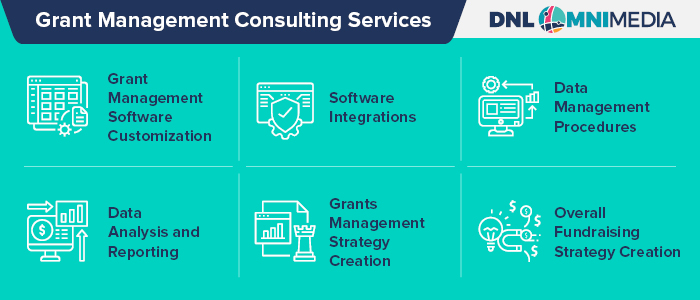
A nonprofit consultant can position a tech-fueled strategy that provides your organization with all of the tools it needs to manage grants successfully. These consultants can:
- Customize your specific grant management software. There are consultants that specialize in even the most comprehensive solutions, including Blackbaud, Salesforce, and more. From creating custom fields to automating reports, these firms can build out your solution.
- Outline data management processes. We’ve discussed the importance of data management in grant management. A consulting firm can build out data procedures to ensure all needed information is logged and not lost in the mix.
- Data, analysis, and reporting. Often, grant proposals include a history of your organization told through analysis of past data. A consultant can help your organization analyze past performance and write that story.
- Create integrations across your tech stack. If you’re working with a separate CRM and grant management software, it’s important that the two systems can inform one another. Your consultant can help build these essential connections.
- Build a strategy that incorporates grant funding into your overall fundraising. Successful grant management involves examining this funding in the scope of your fundraising efforts overall. Consultants can help you create a comprehensive fundraising strategy that encompasses all of your efforts, including grants.
- Create a comprehensive tech strategy to reach your goals. From optimizing your nonprofit’s website to building out advocacy apps, consultants can ensure your organization has all of the tools you need to fulfill your grant proposal promises.
Grant management is a hefty process, and it’s crucial to start from a strong foundation. A nonprofit technology and strategy consulting firm can build a process to ensure your organization is starting on the right foot. At DNL OmniMedia, we often work with organizations to position a strategy for their mid-sized to large (ex: $15,000+) grant management projects. To learn more, contact Team DNL today.
Summary
Grant management is an extensive process, from the initial application to the closeout of the relationship. Effective communication management is crucial to maintain good relationships between funders and your organization– both to maintain current funding and secure future grants.
With effective software and these best practices, you’ll be on the path to strong grant management procedures. For more information on how you can optimize your organization’s tech stack for grants management and more, check out the following additional resources:
- The Ultimate Google Grant Management Guide. Google Grants empower your organization with digital fundraising capabilities. Learn more about applying and managing your grant through this guide.
- Nonprofit Consulting Firms: 16 Leaders in Their Spaces. A nonprofit consultant is a valuable resource when creating a grants management strategy. Check out this guide for a few stand-out partners in the field.
- Creating a Nonprofit Digital Strategy: 7 Steps for Success. A strong digital strategy can help your organization fulfill grant requirements. Explore how Team DNL tackles nonprofit digital strategy creation through this guide.


